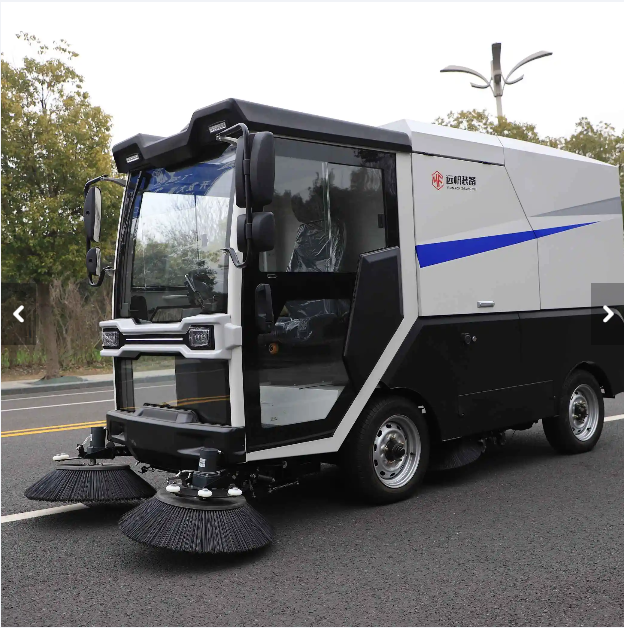Environmental Performance: Hybrid and Electric vs. Traditional Models
Emissions Comparison: CO2 and Pollutants
The carbon footprint of traditional diesel street sweepers is significantly higher than that of hybrid and electric models. Traditional sweepers are known for their substantial CO2 emissions, which can be dramatically reduced through the adoption of hybrid and electric alternatives. For instance, according to the Environmental Protection Agency (EPA), electric models can cut down nitrogen oxides (NOx) and particulate matter emissions significantly—common pollutants that contribute to urban smog and respiratory issues. Research has shown that electric and hybrid street sweepers can lower CO2 emissions by an impressive margin per mile traveled, making them a more environmentally friendly option. Such reductions in emissions not only help improve air quality but also offer a sustainable approach to urban maintenance.
Noise Pollution Reduction in Urban Areas
One main advantage of electric street sweepers over traditional models is their quieter operation. Traditional sweepers often contribute to noise pollution, with decibel levels that can disrupt urban environments, especially in noise-sensitive areas such as residential neighborhoods and downtown districts. Studies have reported that electric sweepers operate at substantially lower noise levels, enhancing public comfort and satisfaction. Cities like New York and Los Angeles are leading the way by adopting electric models specifically to reduce noise pollution. This transition has been met with positive responses from residents, who appreciate the quieter and more serene urban environment supported by these advanced machines.
Case Studies: NYC and LA Fleet Transitions
Both New York City and Los Angeles have implemented successful strategies to transition their street sweeper fleets to hybrid and electric models, underscoring their commitment to sustainability. In New York City, the Clean Fleet Plan advocates for a massive reduction in greenhouse gas emissions, aiming for a 50% decrease by 2025 through the adoption of electric vehicles. The city has seen marked improvements in emissions metrics and received positive feedback from local communities. Meanwhile, Los Angeles introduced the first hybrid-electric street sweepers in the United States thanks to innovative partnerships. Here, efforts to tackle climate change have led to a reduction of up to 30% in fossil fuel consumption. While each city faced challenges, such as the need for infrastructure updates and initial investment costs, these were overcome through strategic planning and collaboration with stakeholders, leading to improved urban sustainability.
Operational Efficiency: Cleaning Power and Maintenance
Battery Life and Charging Infrastructure Needs
Hybrid and electric street sweepers present distinct advantages over traditional diesel models in terms of battery life and charging infrastructure needs. These electric models often feature batteries that last for an entire work shift, unlike their diesel counterparts which require frequent refueling. The challenge, however, lies in establishing a robust charging infrastructure to support these models. Cities investing in electric sweepers must consider the costs associated with installing and maintaining charging stations. A successful example is Los Angeles, where the implementation of plug-in hybrid street sweepers accompanied the development of well-planned charging stations. This strategic approach has significantly improved operational efficiency, reducing downtime attributed to fuel replenishment.
Diesel vs. Hybrid-Electric Sweeper Uptime
Hybrid-electric street sweepers offer superior uptime compared to traditional diesel models, primarily due to optimized maintenance schedules and reduced breakdowns. Data suggests that hybrid-electric models generally require less frequent servicing, minimizing service interruptions. Moreover, maintenance tasks are streamlined, allowing these models to spend more time in active operation. Fleet performance statistics highlight a marked improvement in reliability for hybrid-electric models, drawing positive feedback from operators. Industry experts often commend these models for their robustness and reduced maintenance complexity, further solidifying their standing as a reliable alternative to conventional diesel sweepers.
Adaptability to Different Road Conditions
The adaptability of hybrid and electric street sweepers to various road conditions sets them apart from traditional models. These vehicles boast enhanced maneuverability that allows them to efficiently navigate through narrow urban streets and diverse climates. Trial runs and studies indicate that electric models deliver a consistent performance in different environments, often surpassing traditional diesel sweepers. Feedback from fleet operators emphasizes the operational flexibility offered by these new technologies, particularly in urban settings where street conditions can be unpredictable. This adaptability not only improves cleaning efficiency but also ensures utility across a range of operational scenarios.
Economic Considerations: Costs and Savings
Upfront Investment in Hybrid-Electric Technology
Investing in hybrid-electric street sweepers involves significant upfront costs when compared to traditional models, but the long-term benefits can't be overlooked. Traditional diesel sweepers may have lower initial purchase prices, but hybrid-electric models promise considerable savings over time. The added expense is often mitigated by funding options available to municipalities committed to adopting greener technology. Funding avenues include government grants, low-interest loans, and incentives for sustainable city fleets, making the transition financially feasible. Case studies, such as those from cities like Los Angeles, highlight significant returns on investment (ROI) when agencies switch to hybrid models. Longer operational lifespan, lower maintenance costs, and fuel savings contribute to considerable financial benefits over traditional methods.
Long-Term Fuel and Maintenance Savings
The long-term savings associated with fuel and maintenance for hybrid-electric street sweepers offer a compelling financial advantage. Cities that have transitioned to electric models, such as New York, report significant reductions in both fuel expenses and maintenance costs. These savings are especially pronounced as electric sweepers utilize kWh for energy, which is generally cheaper than diesel. Additionally, electric sweepers have fewer moving parts, reducing the likelihood of mechanical failures and, consequently, decreasing maintenance costs. Industry reports estimate reductions in expenses over the lifespan of the vehicle due to fluctuating fuel prices, suggesting further cost-effectiveness in the future.
Government Incentives for Sustainable Fleets
Various government initiatives provide incentives to support municipalities in transitioning to more sustainable fleets, like hybrid and electric street sweepers. These programs offer grants and subsidies that can cover a substantial portion of the purchase and operating costs, making it easier for cities to adopt this technology. Compliance with strict emissions regulations not only fosters a healthier environment but often results in financial benefits due to incentives for lower emissions outputs. Interviews with government officials underline the importance of such programs in pioneering the shift toward greener technology, ensuring municipalities meet regulatory requirements while gaining substantial financial and environmental benefits.
Future Outlook: Innovations in Street Sweeping
Advances in Battery Technology and Range
The future of battery technology for electric street sweepers promises enhancements in efficiency and range. Continued advancements are expected to shift toward solid-state batteries, which offer higher energy density and improved safety features compared to current lithium-ion options. Specifically, the operational capabilities of street sweepers would be greatly enhanced, extending their cleaning durations and reducing downtime for charging. Manufacturers like Elgin have already established themselves as pioneers in this field, creating models like the hybrid Broom Bears, which utilize a combination of battery-electric power and natural gas, thus setting a standard for innovation in street sweeping technology.
Renewable Energy Integration Trends
The integration of renewable energy sources to power charging stations is gaining traction in the street sweeping sector. Cities like Los Angeles are beginning to harness solar and wind energy to support their green fleets, thereby minimizing reliance on fossil fuels. For instance, Los Angeles's new Center for Green Innovation is actively developing near-zero and zero-emission street equipment. This movement not only reduces carbon footprints but also aligns with broader environmental goals. Statistics show significant carbon reduction when renewable energy is used instead of traditional power sources, contributing positively to municipal commitments towards sustainability. As more cities adopt these practices, individual community impacts are predicted to expand the reach of clean energy initiatives.
FAQs
What are the environmental benefits of using hybrid and electric street sweepers?
Hybrid and electric street sweepers have a lower carbon footprint compared to diesel models, reducing CO2 and other harmful emissions. They also produce less noise pollution, improving urban living conditions.
How do hybrid and electric street sweepers save on costs in the long run?
These models offer savings on fuel and maintenance costs, and municipalities can access government incentives. Despite higher upfront costs, they prove to be cost-effective over time due to decreased operational expenses.
Are cities currently using hybrid and electric street sweepers?
Yes, cities like New York and Los Angeles have already incorporated hybrid and electric models into their fleets, leading to improvements in sustainability and reductions in emissions and noise pollution.
What challenges are associated with adopting hybrid and electric street sweepers?
Initial investment costs and the need for charging infrastructure are primary challenges. However, many cities overcome these hurdles through careful planning and collaborations with stakeholders.
Table of Contents
- Environmental Performance: Hybrid and Electric vs. Traditional Models
- Operational Efficiency: Cleaning Power and Maintenance
- Economic Considerations: Costs and Savings
- Future Outlook: Innovations in Street Sweeping
-
FAQs
- What are the environmental benefits of using hybrid and electric street sweepers?
- How do hybrid and electric street sweepers save on costs in the long run?
- Are cities currently using hybrid and electric street sweepers?
- What challenges are associated with adopting hybrid and electric street sweepers?
 EN
EN
 AR
AR
 FR
FR
 HI
HI
 JA
JA
 KO
KO
 PT
PT
 RU
RU
 ES
ES
 IW
IW
 VI
VI
 TH
TH
 MS
MS

